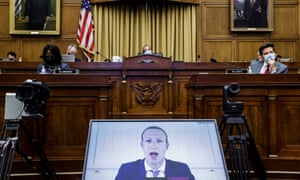That hardly exaggerates their might. Between them, and with their users numbered in the billions, Facebook and Google determine much of what the human race sees, reads and knows. Mark Zuckerberg’s writ runs across the planet, no single government is able to constrain him: he is an emperor of knowledge, a minister of information for the entire world. A mere tweak of an algorithm by Facebook can decide whether lies, hate and conspiracy theories spread or shrivel.
That’s been true for a while, but in 2020 it’s gained an extra urgency. We know the impact social media had in the US election in 2016 – when ever wilder fictions and fantasies were allowed to proliferate about Hillary Clinton and when, according to the Oxford scholar Philip Howard in a new book, Lie Machines: “There was a one-to-one ratio of junk news to professional news shared by voters over Twitter.” In fewer than 100 days Americans will choose a president, and there are no guarantees that the same thing will not happen again.
What’s more, it’s now clear that the online spread of falsehoods is a matter of life and death. (They knew that already in Myanmar, where the violence against the Rohingya people was incited on Facebook.) In the midst of a pandemic, solid, verified information is an essential tool of public health. If bogus claims and unhinged conspiracy theories – like those aired in a pseudo-documentary such as Plandemic – land in people’s news feeds, it’s as if the water supply has become contaminated. Eventually Facebook and YouTube took down Plandemic, with its evidence-free assertions that Covid-19 is the fault of Bill Gates and the World Health Organization, that vaccines are bad and that wearing a mask is dangerous, but not before millions had ingested that garbage on those platforms.
Of course, cranks and fantasists have been with us forever, but social media has given them a reach they could never have dreamed of. Armed with Facebook, the would-be propagandist can distribute messages globally and instantly and, at the same time, deliver them to a precisely selected audience, thanks to the copious data Facebook holds on its users, the use of which allows ads to be micro-targeted for a price. And remember, this data isn’t limited to the attitudes you might have expressed online, but could include the purchases you’ve made on your credit card, even the mundane details of your life, as recorded by the gadgets that comprise the internet of things.
Occasionally the social media behemoths are compelled to take at least the appearance of action, if only for the sake of managing their own reputations. It happened this week, with the eventual removal of grime artist Wiley from multiple platforms after he went on an extended, hate-filled rant against Jews: after a 48-hour “walkout” from Twitter, organised by an ad-hoc group of activists and celebrities, the network appeared to realise hosting high-profile racism isn’t a good look. Today, Twitter removed the account of white supremacist David Duke, which prompts the question: what on earth took you so long?
Make no mistake, the presence of lies and hate on these platforms is not some regrettable bug. It is a feature. The business model for social media requires attention – eyeballs – and the best way to get that is engagement. Messages that stir anger, fury and yes, hate, keep people online more effectively than content that is merely interesting or amusing. It’s why studies show that false news spreads faster than true news: the algorithms are designed to favour virality over veracity.
What can be done? There’s no shortage of ideas. Some start with the demand for fact-checking and, after the 2016 election, Facebook took steps in that direction. But when it emerged that one of its fact-checking partners was Daily Caller, a rightwing news website known for pushing misinformation, the scheme’s credibility plunged.
Or, more simply, Facebook, YouTube and Twitter could admit that of course they are publishers and they should therefore take the responsibility that goes with the mighty power they have. If that means hiring a million moderators to check their content, weeding out lies and hate, then so be it. They can hardly cry poverty: these are close to trillion-dollar companies.
If they don’t like the analogy with publishers, then perhaps they’d rather be treated like, say, car manufacturers, who, if found to be delivering a dangerously faulty product, have to recall and fix that product, regardless of the expense. At the moment, the social media giants enjoy legal protectionfrom such liability in the US.
Politicians could change that, just as they could follow Howard’s demands in Lie Machines and break the big companies’ “monopolisation of information” by legislating a citizens’ right to donate their own data to smaller organisations: that way such groups would be more able to compete with the tech giants and those able to pay for their services.
But, as this week’s hearing proved, elected representatives are not powerful enough to do that alone. They’d have to work together, governments across the globe. They’d need the backing of advertisers, withdrawing their pounds and dollars from companies that give a platform to hate. And they’d need all of us to declare we’re sick of this poison in the information bloodstream, and we won’t rest till it’s drained away.
• Jonathan Freedland is a Guardian columnist

![]() you may also be interested in THAT article
you may also be interested in THAT article